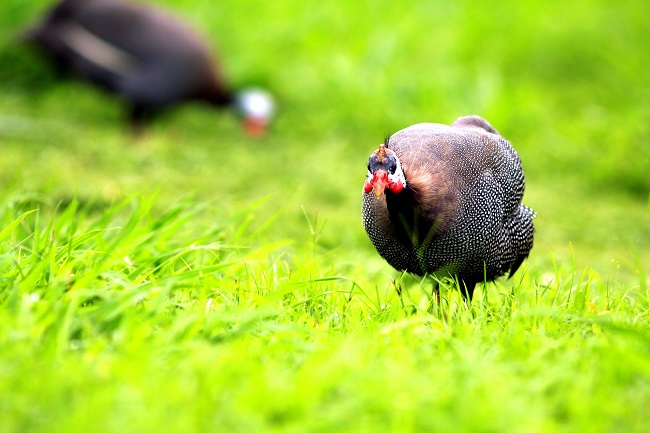
A Guinea fowl is a type of bird that is native to Africa but is also found in many other parts of the world, including North America, Europe, and Asia. It is a domesticated bird that is raised for its meat and eggs, as well as for pest control purposes. Guinea fowl have a unique appearance, with a small, featherless head, a plump body, and spotted or striped feathers in shades of gray, brown, and white. They are social birds that typically live in flocks, and are known for their loud, distinctive calls that can be heard up to a mile away. Guinea fowl are also popular as ornamental birds and are sometimes kept as pets.
How to Care for Guinea Fowl
Environment
Guinea fowl need a safe and secure living space, preferably in a coop or a pen with a roof and sturdy walls to protect them from predators. They also require adequate space to move around, so make sure they have plenty of room to roam.
Diet
Guinea fowl are omnivorous and require a balanced diet that includes protein, vitamins, and minerals. Feed them a mixture of commercial feed and fresh vegetables, fruits, and grains. They also always need access to clean water.
Maintain Hygiene
Guinea fowl are prone to disease and parasites, so it’s important to keep their living environment clean and dry. Regularly remove feces and dirty bedding, and replace it with clean, fresh material.
Monitor Their Health
Guinea fowl are generally hardy birds, but they can still fall sick. Watch for signs of illness such as lethargy, loss of appetite, or respiratory problems. If you suspect your birds are sick, contact a veterinarian who specializes in poultry.
Provide Social Interaction
Guinea fowl are social birds and prefer to live in groups. If you’re raising only one or two birds, make sure they have enough social interaction with humans or other birds.
They Love to Forage
Guinea fowl love to forage for food and insects, so allow them access to open areas where they can search for food. This also helps keep them entertained and reduces boredom.
Predators
Guinea fowl are vulnerable to predators such as foxes, coyotes, and birds of prey. Make sure their living space is secure and inaccessible to predators.
9 Fun Facts About Guinea Fowl
Guinea fowl are native to Africa and were domesticated over 2,000 years ago.
Guinea fowl are known for their loud, distinctive calls that can be heard up to a mile away. They make a variety of sounds, including honking, chirping, and squawking.
Guinea fowl are popular for their meat, which is low in fat and high in protein. They are also used for their eggs, which have a richer flavor than chicken eggs.
Guinea fowl are excellent foragers and will eat a variety of insects, seeds, and vegetation. They are often used as natural pest control in gardens and farms.
Guinea fowl are social birds that prefer to live in flocks. They have a hierarchical social structure, with dominant birds leading the group.
Guinea fowl are hardy birds and can tolerate a range of temperatures, from hot and dry to cold and wet.
Guinea fowl are intelligent birds and can be trained to perform simple tricks and tasks.
Guinea fowl are sometimes used as “watchdogs” because of their loud calls and ability to alert their owners to potential intruders.
Guinea fowl have been used in traditional African medicine for their supposed medicinal properties, such as treating respiratory problems and digestive issues.
Related Articles & Free Email Newsletter Sign Up
3 Reasons to Handle Your Pet Bird Every Day
Are Seeds or Pellets Better for a Bird?


Comment here